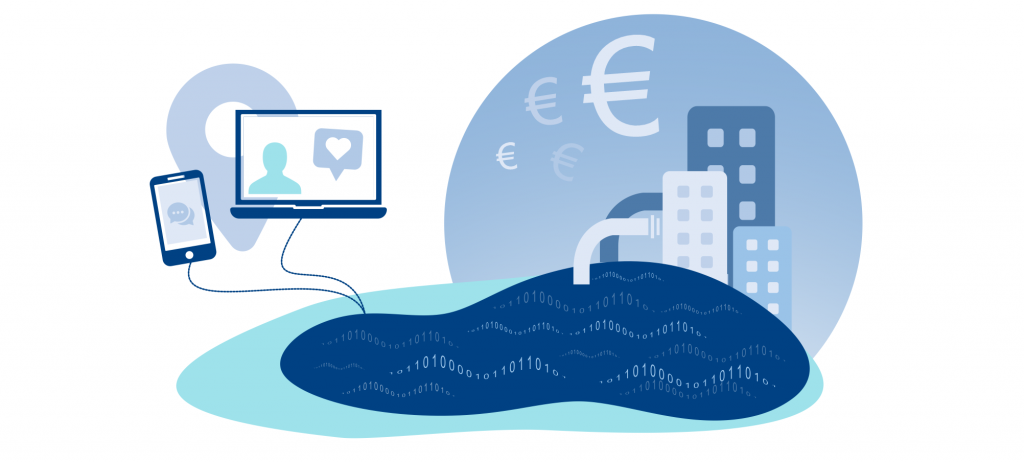Written by: Tommi Mikkonen, University of Helsinki
Fair use data is one of the key elements of responsible AI. We shouldn’t only care about the quality of the data, but also how it was retrieved (mind you, often there are important connections between the two). In the digital economy, personal data is currency. Platforms like Facebook or Snapchat appear free but, as we are finally becoming aware, they are not. Are we, as users, paying too high of a prize for these services? In this blog post, we wish to show that re-shifting the flows of personal data is possible.
The idea of users being in control of their own digital footprint is not unique for this post. Initiatives like MyLife Digital, MyData, BitsAboutMe and DigiMe have provided alternative visions for the future of data sharing. However, adding control mechanisms on top of the current system is not enough. Our scenario includes ways to block the undesired, exploitative flows of personal data, which would be one step forward from the current solutions.
Personal data blight & AI development
Even if there was a button to immediately stop sharing any personal information, would you click it? If you just hesitated a bit, you are not alone. Even if privacy matters to you, you might enjoy the great music recommendations, optimized search results, and other benefits that are unleashed by your previous actions. Or perhaps you’d be happy to share if that meant better online services but would rather avoid targeted advertisements.
We prefer an option that allows people to share their personal data in a controlled manner while maintaining ownership.
Many service providers offer little or no information about the personal data they are collecting and exchanging with third parties. Including this information in the long list of terms and conditions is only a minor improvement. The predominant type of end-user license agreement is “take it or leave it” that forces the users to choose from two suboptimal alternatives.
Despite the inconveniences, the users could opt out and decline any requests to access their personal data. For such a move to have an effect, this choice should be shared by many, causing a deficiency of personal data. If the sharing of personal data stopped completely, the data consumers would face what we call the personal data blight.
The personal data blight would quickly affect AI development and halt projects that aim for the common good, such as AI-assisted health care or diversity and inclusiveness initiatives.

Is there a sustainable way for data sharing?
Even though data blight should be avoided, perhaps we could do with little less than the big data advocates proclaim. Virginia Dignum has even argued that small data is the future of AI. The utility of a small dataset could exceed that of a big one if the quality is significantly higher.
When information is voluntarily shared, the data can become more meaningful for the data consumers. If the user has been informed about how and why the data will be used, he/she might be more willing to contribute. Likewise, no user would feel the need to conceal or fabricate the data, as potential distrust between the users and data consumers is erased thanks to transparency.
We propose a data enfranchisement scenario, where users decide to whom and for what purposes they are giving away their personal data.
Re-shifting the flows of personal data
Data enfranchisement is possible through a series of well-defined steps. We propose a shift from the absolute lack of control mechanisms to the fair, interactive and transparent utilization of personal data.
In this transformation, users are first made aware that their personal data is being processed, then provided with more information about the attributes collected and the purposes of data collection. In advanced scenarios, users will be provided the tools to individually negotiate with service providers and data consumers. Finally, all data service providers should adopt similar processes and commit to unlocking the data for the common good.
We believe personal data enfranchisement is the responsible way of harvesting the “food for AI”, as it will bring more societal benefits without sacrificing the economic gains.
Click here to read our published article and learn more about data enfranchisement.

